- Home
- Patricia McLinn
Death on Covert Circle Page 6
Death on Covert Circle Read online
Page 6
“No.” Back to the whispery voice he’d used with Birchall. Hard to tell if he was reacting to the reprimand or cringing at the idea of anyone seeing him in the restroom.
“No alibi,” Isaac said with satisfaction.
Delivery deputy turned the stern look at him, but unlike Utton, it didn’t dent Isaac.
Then the delivery deputy’s focus shifted to another segment of the group — Clara and me.
“Mrs. Woodrow, Ms. Mackey, Deputy Hensen will talk to you now.”
CHAPTER TWELVE
A photographer carefully set up shots of produce.
Not the kind to grace glossy ads.
He was part of the investigative team and taking photos of the doors to the back room and its surroundings, as well as areas Rod Birchall had been.
That put the display of strawberries off limits. To my relief, the deputy escorted us to a mass of carrots against the store’s front wall. It could have been Brussels sprouts.
The deputy gestured for us to stay there — the same stop-sign hand command I used with Gracie for “stay” — and went to Hensen.
The deputy spoke in a low voice.
As if we didn’t know he was repeating what we’d heard Foster Utton acknowledge about leaving the watch party outside the door Birchall had gone in.
Hensen, hands on hips, watched a technician checking the area around the melons.
Right where Utton had been when he’d crumpled.
Did they think he’d faked it to have an opportunity to slip something into or under the case?
Hensen’s attention shifted to sounds of activity behind the doors to the back room, caught in snippets when a coverall-clad technician opened the door slightly and called to the photographer.
Finally, Hensen nodded to the delivery deputy, then joined us. He leaned back so his hips rested against the apple display across from us.
“I’ve told the other two people who heard it and now I’m telling you both. You are ordered by the North Bend County Sheriff’s Department to not tell anyone what that man said about Rod Birchall being hit in the head. There will be serious repercussions if you do. Do you understand?”
I nodded. Clara did more.
“Of course, we won’t, what do you take us for? But it’s about time you talk to us, Deputy Hensen.” She managed to make that scold sound friendly. She truly had a gift. “Because it wasn’t only Foster Utton. We saw a bunch of them out in the store.”
“A bunch of who?” He’d asked automatically, most of his focus on whatever was going on in his head.
“The suspects, of course.”
Did he have a direction to follow investigating? Something gathered from evidence beyond these doors?
Did I regret not going into the back room?
Yes. And no.
Yes, I wanted to know all the evidence.
No, for those three reasons — Hensen, Teague, and an autopsy.
Most great aunts probably take their great nieces and nephews to the zoo, a movie, the park. Kit had taken me to an autopsy. Once.
“Nothing special about seeing the suspects,” Hensen said. “Everybody saw each other. They were all in the store. Including you two.”
Clara clicked her tongue at him. “We’re not suspects.” I would not have been surprised if she’d tacked on You silly. But she restrained herself, leaving her tone to convey the message. “And everybody — at least Jacqueline, and Foster Utton, and that male customer — saw each other here in the produce section. But we saw them out in the store.”
She’d made a tight circle with her hand when she mentioned the produce section. Now she gestured widely to convey the expansiveness of the rest of the store.
“Who did you see where?”
“And when,” Clara added, “might be important, too. First, we saw the guy who said he’d stay with Mr. Birchall’s body, but now seems to have disappeared. Unless you found him?”
“I’m asking the questions.”
She swung her arm to wave that off. “He was walking — fast — away from the produce section. That wasn’t too long after we’d left the others. Us and a couple other customers.”
“What other customers?”
“Two women. They weren’t together, do you think, Sheila?”
“No. I agree. They weren’t together.”
“Who were they?” Hensen asked.
“I don’t know,” Clara and I said in unison. My spirits sank. I’d held out hope she might have known the teacherish woman.
Between the two of us, we described them fairly well, though a lot of our detail relied on what they were wearing. Change their clothes and we were out of luck. Except… “The other woman takes her terrier mix to the dog park. They’re often leaving around noon, but the morning side of noon. Send somebody out there a few days and they’ll spot her. Look for a dog with a neon green collar. She’s the woman with him. Just don’t send Deputy Eckles.”
“Doesn’t know one dog from another,” Clara said in deep disapproval.
A muscle beside Hensen’s mouth ticked. But that was the limit of his reaction.
“And I think the teacherish woman might have been on her way out when we saw her shortly after we all left the produce section. The dog woman definitely hit the pets aisle, but wasn’t there when we were later,” I said.
“But back to the guy who said he’d stay with the body,” Clara picked up. “Obviously, he went back to the produce section after we saw him walking away from it, or he wouldn’t have been there when we found the body.”
“We don’t know when he returned to the produce section or whether that would have given him enough time to go into the back from another door, kill Birchall, and circle back to the produce section, appearing innocent,” I said. “But if he did all that, why call attention to himself by taking off before the sheriff’s department arrived?”
“Panic?” Clara asked.
Hensen wasn’t drawn into our discussion. “Who else did you see?”
“Isaac — well in front of the guy in jeans, walking the same direction, toward the opposite side of the store from the produce section. Until he turned into an aisle. The seasonal goods or an aisle one side or the other of it,” Clara said.
“Isaac?” Hensen asked.
“Mr. Birchall’s driver.”
“You’re on a first-name basis with him?”
“He didn’t give his last name when we ques—”
“Talked with him. When we were talking — all of us — about the tragedy.” I don’t know why I even bothered. Not only had Hensen correctly filled in the end of Clara’s word as questioning, but watchdog deputy had heard everything.
“Uh-huh,” he said.
“Anyway, that’s not the point,” Clara said earnestly. “The point is if he tells you he was never away from the limo, the way he told us when he said Foster Utton lied when he said he went out to the car — which he did. Lie I mean. Foster Utton did. Because we saw him and he might have been going to the restroom but we couldn’t know for sure. But Isaac lied, too, because he was in the store so he wasn’t always by the car.”
Hensen looked a trifle battered, but rallied. “Anyone else?”
“The next one was Foster Utton, also heading away from the produce section, so he could have been going to the restroom. Then a gap, because I was telling Sheila a story about my dog, LuLu, and it was at the very end I saw a woman without a cart or anything in her hands.”
“Is that significant?” he asked.
“It was to Sheila,” Clara said.
Hensen looked at me. I shrugged. “An idle observation, Deputy Hensen. That’s all. Anyway, it was Jacqueline, the assistant store manager, we saw next. We were an aisle or two from the far end of the store. We continued down those couple of aisles, then headed back, stopping for dog treats on our way back to the produce section. When we got to produce, Jacqueline was there, along with Foster Utton, and the guy in jeans.”
“That’s the order of everybody we saw.�
� Clara’s eyes brightened. “We could figure out the timing pretty closely with a re-creation while someone times us.”
“We’ll see if it comes to that.” His tone put it in the same category as pigs doing loop-de-loops in the stratosphere, visibly dashing Clara’s glowing hopes. “If you’ve covered everyone—”
“The woman with the little girl,” I blurted out, interrupting Hensen’s gear-changing.
Clara frowned. “Right. And we saw them going away from this side of the store, so they must have backtracked at some point, because we definitely saw them leave produce earlier. But we didn’t see the backtracking.”
“We could have missed them because we weren’t looking up at the right moment or—”
“Or they were deliberately avoiding us,” Clara finished with dramatic effect. Then, more pragmatically, “Well, the woman might have been avoiding us. The little girl wouldn’t have had any say in it.”
“What’s this about a woman with a little girl?” Hensen asked.
“Rod Birchall wanted to have his picture taken with the woman’s daughter and she decidedly did not want that to happen. They also exchanged words over food labeling. She left before he brought up going in the back room, though.”
“What made you think of her, then?” Hensen asked.
Good question. I searched, but couldn’t find a logical thread that led to my blurting out about the woman and child.
“I don’t know.”
Clara clicked her tongue. “I do. Because her reaction to Birchall was so intense. Emotional. She practically vibrated with it. Her voice did shake.”
Hensen said, “Tell me more about this exchange about… What was it?”
“Food labeling. Things people are allergic to.”
We told him.
“…and then it turns out Birchall had a food allergy himself. But Jacqueline must have told you,” Clara said.
“You tell me.”
She did.
At the end, Hensen nodded, then said abruptly to me, “Why are you so quiet?”
He made it sound like it happened as often as Halley’s Comet. I took the high road and ignored that misjustice.
“I was thinking about my saying the woman left before Rod Birchall talked about going in the back room. It is true she left this area. But he was rather loud. If she’d been in the next aisle, she could have heard him.”
“You don’t know who she was?” He looked at Clara.
She shook her head.
“You didn’t see where she went?” That was for both of us.
We shook our heads in unison.
“Okay. Go back to the beginning. When did you arrive at the store?”
We figured the time within fifteen minutes or so, based on when our meeting broke up. But we gave him plenty of detail on the rest, including an impressive amount of verbatim conversation, if I do say so myself.
We fed off each other, correcting, clarifying, and expanding as we went.
Yes, we wanted to investigate, but not by withholding information from the authorities.
“…so you have all the ones who interacted with Rod Birchall sitting in the housewares aisle except for the dog park woman, the teacherish customer, and the woman with the little girl,” Clara said. “Oh, yes, and the guy in jeans. I suppose one of the customers who stood around and listened might had been nursing a murderous rage at him, but they hid it quite well if they did. Of the customers, I’d definitely say you should find the guy in jeans and the woman with the little girl. Not trying to tell you your job, but as a witness, that’s my take.”
“Thank you.” He laced that with high levels of sarcasm.
Clara sailed right past it. “But, remember, the woman with the girl is not the only one. All the others we told you about were out and about in the store. As I said, we could narrow the approximate times they must have been away from the others by where we were when we saw them out in the store if— Oh.” Her excitement deflated. “Security cameras. This store has security cameras, doesn’t it? You’ll be able to see everyone and time stamps will tell you exactly when. You don’t need us at all.”
I leaned forward, looking at Hensen. “Don’t despair yet, Clara. We might not be completely obsolete.”
“Why? Oh. Deputy Hensen?”
He said nothing.
But I was nearly certain she’d have revenge for his sarcasm.
“The Roger definitely has security cameras and not only by the registers,” I mused. “And they wouldn’t have the old, cruddy ones like businesses in town mostly have. So… A malfunction?” I watched his face. “No. Not a malfunction.”
“I’m not saying anything.”
Except the way he said it…
“Somebody blocked a camera.” My guess didn’t change his expression. Darn.
Clara perked up. “Like spray paint over the lens like they do in movies? Is that what you mean, Sheila? Or they put something up in front of it? But wouldn’t you see the person as they were going to block it?”
Still no change from Hensen.
“Possibly,” I said to Clara. “But, if they saw someone block the camera, I doubt he’d be spending this time with us. He’d be questioning that person.”
“Blocked and they couldn’t see who blocked it?” Clara hypothesized.
We both looked at Hensen. He looked back, blandly indifferent.
“Disabled,” I suggested.
“Oh, that’s it, Sheila. Someone disabled the cameras. Or one of the cameras. Who—?”
Hensen stood.
“Go on. Both of you. Get out of here.”
Defiantly, Clara grabbed the cart. No one objected.
CHAPTER THIRTEEN
Delivery deputy accompanied us only as far as the housewares aisle.
After exchanging a long-distance nod with a deputy by the cash registers, he instructed us to go directly to the doors and leave. Then he turned into the aisle, aiming for the group.
In the moment of recognition that he was not bringing us back to the group, that we were free to go — or ordered to get out of here, depending on how you looked at it — the faces of those sitting in the aisle declared we’d turned into outsiders.
Next time we talked to them, we’d have to make up ground to reconnect at the level we’d been at when we all shared being herded into the housewares aisle.
I’d leave that to Clara’s expertise.
She interrupted my thoughts by saying, “I almost forgot, I have to pay for Ned’s orange juice and the rest. Good thing he didn’t want ice cream. We’d have soup by now.”
As we adjusted our route ever so slightly to include the checkout line, the deputy who’d exchanged nods with delivery deputy frowned, then looked away, tacitly acquiescing to our detour.
He couldn’t very well order us to leave without paying.
Clara said in a low voice, “Don’t you think it’s weird that guy who said he’d stay with the body wasn’t there?”
“Beyond weird.”
“But for him to leave wouldn’t Jacqueline have had to let him out? She said she was going to the front to lock the doors.”
“If she did, someone — other customers or employees gathered by the doors — probably would have seen.”
But there was another possibility.
The front of the store was still locked up, with individual customers being allowed out once the deputies taking statements were satisfied. An unhappy trio by the customer service desk apparently were being held for more conversation.
I didn’t recognize any of them.
The woman who’d yelled at Birchall and her daughter were not among either group. Neither was the early forties guy in jeans.
A bored gray-haired cashier operated the one register lane in service. She didn’t look any more energized when we unloaded the cart into our separate purchases.
I leaned over and said quietly to Clara, “When we’ve checked out, let’s drive around the back of the store before we leave.”
* *
* *
The front of the Roger was no Taj Mahal, but the back was your basic modern warehouse un-chic.
Blank brick walls, punctuated by a line of raised garage-type doors, each surrounded by black material. Cushioning? Or a seal for refrigerator trucks?
All the doors were closed and even if they’d been open, it would have been quite a jump to the ground. Maybe the guy in jeans could have done it without injury. Maybe not.
An escape route that might appeal to someone desperate. But the guy in jeans had not appeared desperate.
“Not too exciting,” Clara said, clearly sharing my reaction. “Why’d you want to see this? Nobody’s back here.”
“Now. But a truck could have been there when Birchall was killed.”
“The truck driver killed him and then left? Oh, or could someone have gotten away in the back of a truck? Or have been helped by the driver to get away?” She tipped her head. “I bet they keep track of who comes and goes back here. Checking in trucks, checking them out.”
“That’s good, Clara. I bet you’re right. Though it’s a long shot.” I wrinkled my nose. “Have to admit, it all seems a longer shot than I originally thought.”
I told her my wondering about the guy in the jeans and if he could have come out this way.
“Good thinking and there’s—”
“Hey. What are you doing here?”
A fierce deputy appeared at Clara’s rolled-down window.
As fierce as a twelve-year-old can look.
Seriously, when did law enforcement start employing twelve-year-olds? It’s not a sign I’m aging. It’s not.
He bent down to extend the fierce look from Clara to me.
“Oh, Officer.” Clara fluttered like a length of chiffon caught in a gale. “I got all turned around and my friend here is so annoyed with me. I knew I was going to cry and of course I had to stop because it’s so dangerous to operate a motor vehicle under emotional distress. Why I saw a documentary that said it’s nearly as dangerous as talking on the phone or texting while driving. Of course, if you combine them, that’s the worst. Really, they should have devices that test your emotions while you’re behind the wheel like breathalyzers for people with DUI convictions, which is awful, because—”

_preview.jpg) Almost a Bride (Wyoming Wildflowers Book 1)
Almost a Bride (Wyoming Wildflowers Book 1)_preview.jpg) Prelude to a Wedding (The Wedding Series Book 1)
Prelude to a Wedding (The Wedding Series Book 1)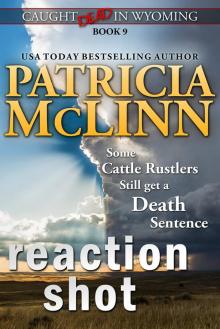 Reaction Shot (Caught Dead in Wyoming, Book 9)
Reaction Shot (Caught Dead in Wyoming, Book 9) Warm Front
Warm Front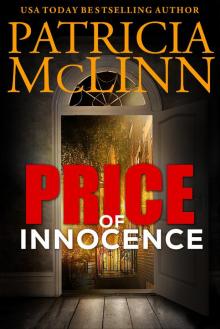 Price of Innocence
Price of Innocence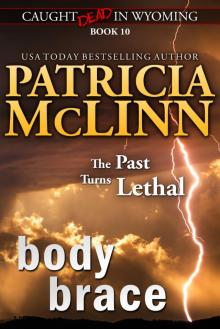 Body Brace (Caught Dead in Wyoming, Book 10)
Body Brace (Caught Dead in Wyoming, Book 10)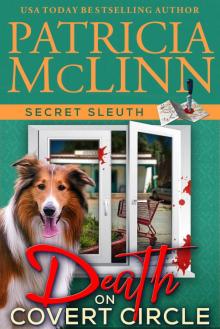 Death on Covert Circle
Death on Covert Circle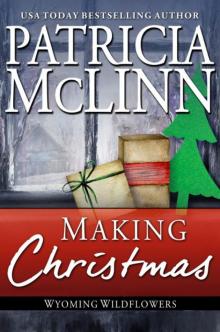 Making Christmas
Making Christmas Death on Torrid Ave.
Death on Torrid Ave.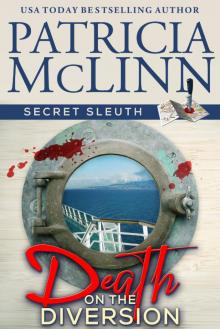 Death on the Diversion
Death on the Diversion The Rancher Meets His Match
The Rancher Meets His Match Widow Woman
Widow Woman The Runaway Bride
The Runaway Bride Hoops
Hoops A Stranger in the Family (Book 1, Bardville, Wyoming Trilogy)
A Stranger in the Family (Book 1, Bardville, Wyoming Trilogy)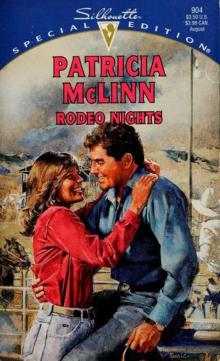 Rodeo Nights
Rodeo Nights Wedding Series Boxed Set (3 Books in 1) (The Wedding Series)
Wedding Series Boxed Set (3 Books in 1) (The Wedding Series)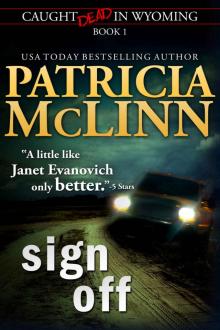 Sign Off (Caught Dead in Wyoming, Book 1)
Sign Off (Caught Dead in Wyoming, Book 1) Prelude to a Wedding
Prelude to a Wedding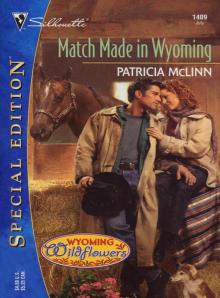 MATCH MADE IN WYOMING
MATCH MADE IN WYOMING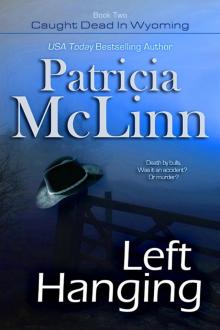 Left Hanging
Left Hanging What Are Friends For?
What Are Friends For?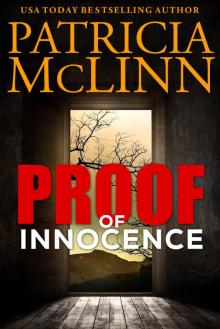 Proof of Innocence
Proof of Innocence Hidden in a Heartbeat (A Place Called Home, Book 3)
Hidden in a Heartbeat (A Place Called Home, Book 3) Baby Blues and Wedding Bells
Baby Blues and Wedding Bells Least Likely Wedding?
Least Likely Wedding? Heart Stealers
Heart Stealers Grady's Wedding
Grady's Wedding Right Brother
Right Brother Wedding of the Century
Wedding of the Century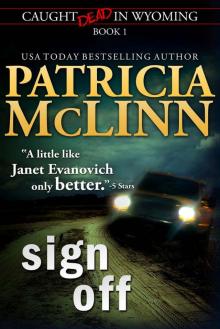 Sign Off
Sign Off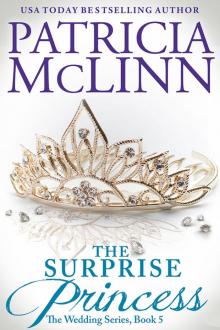 The Surprise Princess
The Surprise Princess Wyoming Wildflowers: The Beginning
Wyoming Wildflowers: The Beginning